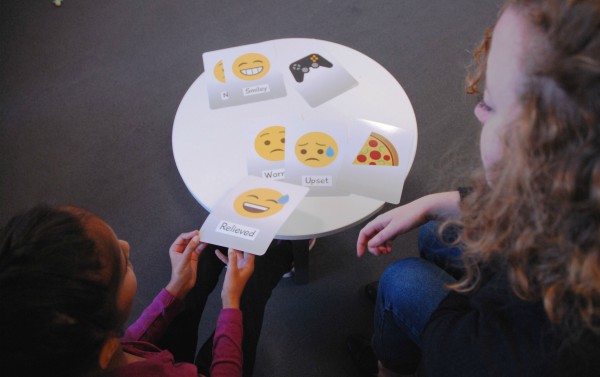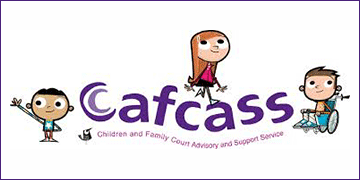“There’s an emphasis on ‘we’ll support you to do the right thing, but the right thing is down to you’. This is your professional integrity.”
Adam Birchall, a service manager in the Early Intervention Team (EIT) covering Warwickshire, Northamptonshire and Coventry at Cafcass, is describing the professional autonomy staff enjoy. “You’ll hear practitioners talk about their professional autonomy. It’s something they’re proud of.”
Victoria Forson, a family court advisor (FCA) within the Work After First Hearing Team (WAFH) covering the same areas, agrees.
“I’m an independent expert, and managers treat you as such. You get lots of support, but at the same time you’re the one who’s seen the children, the home and the parents and you’ve read everything. A manager knows structures and policies, but you know the family and you have to own it when you’re giving evidence.”
Adam and Victoria joined Cafcass after lengthy stints at local authorities. Both wanted a fresh challenge and Adam feels he’s got that that in just under a year at the organisation.
The EIT’s work focuses on safeguarding and largely takes place over the telephone with parties including parents, the police and social workers, with his team members also in court on average once a week. “There’s a real delight in being able to forge relationships over a telephone call and having to think about what you’re advising the caller, and about the welfare of the people you’re speaking to.”
Victoria is adamant that four years in, she is in her “dream job”. Her role, amongst other things, includes court appearances and visits to children and families, working across both care proceedings and private law cases.
“I was at a point where I either go into management or move on. Throughout my career, I really enjoyed court work. I’d worked with a few guardians and enjoyed what they do. Their role is the child’s voice.”
Hearing the child everywhere
Adam is struck by the Cafcass-wide ethos of the voice of the child – extending beyond those directly involved with social work.
He recalls a roadshow by Cafcass chief executive Jacky Tiotto where he was the only social work practitioner on his table, alongside colleagues from IT, HR and business services. “It wasn’t a question about the mission – everyone was talking about children and families.
“Cafcass is set up to work with children and families in the court process, so it doesn’t matter who you talk to in the organisation, they will talk about the child. You expect social workers to talk about the child, but it’s usually from the people you don’t expect and that’s brand new to me.”
Bringing the child to life is the focus of Cafcass’s Family Justice Young People’s Board. The board – which has 50 members, aged between seven and 25 – has a significant part to play, including work organising the annual Voice of the Child conference, meeting with ministers and producing top-tips documentation for practitioners.
“I’ve seen quite a lot of changes in the two years I’ve been on the board and Cafcass are coming up with more for us to get involved with, to make sure our voice is heard,” says board member Imogen.
It’s no surprise then that board members frequently attend recruitment interviews for roles at all levels within Cafcass. “We sit on a panel and get to ask questions and voice our opinion on whether we think FCAs are engaging with us, or if they listen to the voice of the child in how they’re describing their work,” Imogen says, adding that she looks for “somebody who comes across as able to talk to children and young people, who’s good at explaining things and not overcomplicating”.
Most importantly, though, is that “they can see the child is an actual person and it’s their life that they’re affecting. I think that’s really important rather than ticking boxes and ticking cases off a list.”
A flexible mindset
Cafcass encourages flexible working, which Victoria describes as “like nothing you’ve heard of before”.

Victoria Forson
“Take away your mindset of nine to five and look at whatever works for you so long as you do your hours in the day. It could be that you have a morning swim, so you start a bit later in the day, for example.”
This flexibility also helps Victoria structure her days to ensure she spends quality time with the children she is working with. On days where she is in court, she is able to log on and work “from anywhere”, and she regularly works from home.
Cafcass’s investment in technology is keenly felt. Adam says: “I arrived here and the technology allowed me to do my job! The recording system is the easiest and most intuitive I’ve ever come across. It’s a godsend.”
Technology also plays a huge part in direct work with children, with examples including laptops that turn into tablets so children can draw and write directly on to them. In turn, this communication can be embedded directly into reports.
Victoria is enthusiastic. “Direct work at Cafcass is amazing and it makes you fall in love with social work all over again. You get time to do work with children, you’re not in a rush when you’re with children, and they love the tablets. I’m paperless, and I like that. I don’t even have a pen in my work bag!”
Team contact
Victoria admits that a lack of constant contact with the team was a challenge when she joined Cafcass.
“When you work in a local authority office, your team is so important. You go to visits and you come back and can offload on your team. That’s what I missed when I was transitioning in the early days.
“But you build your own friendship groups and I can network better now. I started doing lunch with colleagues before team meetings. If I have a difficult visit I’ve got a couple of colleagues that I ring, or I’ll ring a supervisor. I’ve never not been able to get hold of a manager to discuss a case, or if I’m writing a report and I’m a bit stuck in terms of my recommendations.”
Working remotely doesn’t necessarily mean being remote if you’re a Cafcass practitioner. There are monthly team meetings, and supervision happens on a case-by-case basis, often over the telephone or Skype. All practitioners undergo a quarterly performance and learning review (PLR) via Skype or face-to-face, focusing on individual wellbeing as well as service standards.
“We discuss what’s working,” says Adam. “There’s a self-assessment questionnaire that goes out with every PLR. It’s part and parcel of their supervision, so they come prepared to tell us about their wellbeing. We also grade service standards and it’s very evidence-based – you have to provide two pieces of evidence for each service standard.”
Induction and learning
New recruits have a thorough induction and quality assurance process, which for Adam was important given that it is unusual for “a service manager to start at Cafcass who hasn’t ‘grown up’ at Cafcass”.
“They’d thought about my induction. I went to the central family court and shadowed some FCAs. I was set up with a mentor in a different team. I did a tour of EIT services in different areas of the country to think about the strengths. When I came into my team I had a fuller knowledge of what EIT was and how it works.”
On joining Cafcass, Victoria cites writing as a developmental area she encountered. “When you start at Cafcass your writing skills will be stretched and developed significantly. You’re taught to be succinct and analyse rather than just write.” She recalls writing reports spanning up to 50 pages in previous roles, but “now it’s more like seven to 12 pages”.
Training is continuous at Cafcass, with lots of online learning resources to cater for a nationwide organisation. These include webinars that encourage discussion among participants, but there are also opportunities to travel to different parts of the country for face to face training and development sessions.
Both Adam and Victoria are adamant that a move to Cafcass takes a social worker career to the next level. “It will really extend your professional knowledge,” Victoria stresses.
“I wouldn’t have had the opportunity to develop the skills I have at Cafcass anywhere else. I feel blessed.”
What’s it like to work at Cafcass?
Holiday entitlement: 28 days annual leave a year (plus bank holidays), increasing to 33 days after five years’ continuous service. Continuous service can be carried over from previous employers providing there is no more than a seven-day gap between leaving your current employer and joining Cafcass.
Health and wellbeing: staff are entitled to the health plan, with the basic monthly premium paid by Cafcass. This covers dental and optical care but members can claim financial contributions towards specialist consultations, complementary and alternative therapies and preventative measures. Members can upgrade their plan or pay to include their partner and children.
Employee assistance: staff have access to a 24/7 employee assistance programme accessible by phone, online or face to face.
Flexible working: Staff are given a laptop and mobile and can work from the office, at court or at home as appropriate. Flexible working is actively encouraged at Cafcass.
Travel: Cafcass runs a cycle to work scheme, interest free season ticket loans for those with train journeys and a car-leasing scheme.
Social Work England fees: social workers required to be registered with Social Work England can claim for Cafcass to reimburse their registration fees.




 Facebook
Facebook X
X LinkedIn
LinkedIn Instagram
Instagram